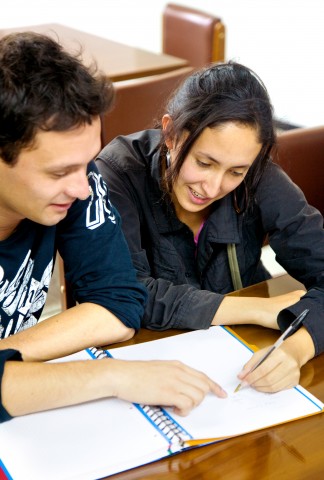
Have you ever heard John Ciardi’s words about the classroom? He says: “The classroom should be an entrance into the world, not an escape from it.” How truthful these words are! So knowing more Bulgarian classroom words and phrases can help you enter into the world of Bulgarian culture.
Why has BulgarianPod101 prepared this extensive guide for you? On one hand, if you live in Bulgaria and attend some Bulgarian language classes, this Bulgarian online guide will help you feel much more confident in a classroom setting. On the other hand, it might be useful for you if you are a foreign language teacher who teaches students in Bulgaria. Moreover, whenever people talk about their studies or education in Bulgarian, you will be able to join the discussion because of the Bulgarian school phrases you have learnt in this guide.
It contains different Bulgarian classroom greetings, teacher’s instructions, phrases that help you ask for clarification, school supplies vocabulary and much more. So let’s imagine we are now in a virtual classroom and learn step by step those useful Bulgarian classroom phrases that will help you start speaking freely on the topic of education.

 Table of Contents
Table of Contents
- Bulgarian Classroom Greetings
- Understand Instructions from Teachers
- Ask for Clarifications from Teachers and Classmates
- Explain Absence and Tardiness
- Talk about Favorite Subjects
- Check for School Supplies
- How BulgarianPod101 Can Help You Learn Bulgarian
1. Bulgarian Classroom Greetings
| Bulgarian classroom greetings | Pronunciation | English translation |
| Здравейте, ученици. | Zdraveyte, uchenitsi. | Hello, students. |
| Здравейте, госпожо Иванова/господин Иванов. | Zdraveyte, gospozho Ivanova/gospodin Ivanov. | Hello, Mrs. Ivanova/Mr. Ivanov. |
| It is common for the teacher to greet the class entering into the classroom the following way and the class to respond to her/him. In previous years the teacher profession was very reputable and all the students had to stand up to greet the teacher when he/she entered the classroom. Currently, this gesture of respect is no longer observed. | ||
| Довиждане, ученици, до утре! | Dovizhdane, uchenitsi, do utre! | Goodbye, students, see you tomorrow! |
| Довиждане, госпожо Иванова/господин Иванов. | Dovizhdane, gospozho Ivanova/gospodin Ivanov. | Goodbye, Mrs. Ivanova/Mr. Ivanov. |
| These are very common phrases for when the lesson is over and the teacher leaves the classroom. | ||
Note that it is common to address a teacher with “госпожо” and “господине” followed by their family name. Even if you have to address the principal of the school directly, the preferred way is to use their family name. For example:
Г-н Димитров, може ли да ми отделите една минута?
G-n Dimitrov, mozhe li da mi otdelite edna minuta?
Mr. Dimitrov, can I take a minute of your time?
Only when writing an official letter to the school principal, his/her title should be mentioned.
An example of an application letter to the school principal
This example might help you write your own application to your school principal. You can only change the request and the reasons for it according to your own situation. We highlighted all those parts that can be modified to customize the application. All other parts can remain as they are.

| До директора на училище “Йордан Йовков”, г-н Антон Димитров МОЛБА от Андрей Василев, ученик в 10 клас Уважаеми г-н Директор, Моля да ми бъде разрешено да отсъствам за два дни от училище поради участие в Олимпиада по математика, която ще се състои на 2 и 3 март 2022 г. в Гърция. Надявам се, че молбата ми ще бъде удовлетворена. гр. София С уважение, 18.02.2022 г. Андрей Василев |
| Do direktora na uchilishte “Yordan Yovkov”, g-n Anton Dimitrov MOLBA ot Andrey Vasilev, uchenik v 10 klas Uvazhaemi g-n Direktor, Molya da mi bade razresheno da otsastvam za dva dni ot uchilishte poradi uchastie v Olimpiada po matematika, koyato shte se sastoi na 2 i 3 mart 2022 godina v Gartsiya. Nadyavam se, che molbata mi shte bade udovletvorena. grad Sofiya S uvazhenie, 18.02.2022 Andrey Vasilev |
| To the principal of “Yordan Yovkov” School, Mr. Anton Dimitrov APPLICATION by Andrey Vassilev, a student in 10th grade Dear Mr. Principal, I ask to be allowed to be absent from school for two days due to participation in the Mathematics Olympiad, which will take place on March 2 and 3, 2022 in Greece. I hope that my request will be approved. Sofia Sincerely, February 18, 2022 Andrei Vasilev |
You might notice some differences in this Bulgarian application compared to the English application to the School Principal.
And what if the Principal is a woman? In that case, you have to change the phrase:
“Уважаеми г-н Директор”
(Uvazhaemi gospodi Direktor)
Dear Mr. Principal
with
“Уважаема г-жо Директор”
(Uvazhaema gospozho Direktor).
Dear Mrs. Principal
And instead of writing
г-н Антон Димитров
(gospodin Anton Dimitrov)
Mr. Anton Dimitrov
at the very beginning of the application, you have to write г-жо followed by her name.
For example: г-жа Антонина Димитрова
(gospozha Antonina Dimitrova)
Mrs. Antonina Dimitrova
* What other good reasons can you point in your application to the principal as an excuse for being absent from lessons? Here are a few more suggestions:
- поради предстоящо пътуване в чужбина
(poradi predstoyashto patuvane v chuzhbina)
due to an upcoming trip abroad
- поради предстоящо лечение
(poradi predstoyashto lechenie)
due to a forthcoming medical treatment
- по лични причини
(po lichni prichini)
for personal reasons
2. Understand Instructions from Teachers
It is very important to understand the teacher’s instructions in class or you might miss something really essential. Here is a list of some common phrases that teachers use in the classroom.
| Bulgarian classroom instructions | Pronunciation | English translation |
| Моля, отворете учебника на страница Х. | Molya, otvorete uchebnika na stranitsa Х. | Please open your textbook on page X. |
| Here is an example: Моля, отворете учебника на страница двадесет и първа. (Molya, otvorete uchebnika na stranitsa dvadeset i parva) Please open the textbook on page twenty-one.
| ||
| Тишина, моля. / Запазете тишина. | Tishina, molya. / Zapazete tishina. | Silence, please. / Keep silent. |
| Слушайте внимателно! | Slushayte vnimatelno! | Listen carefully! |
| Имате ли въпроси? | Imate li vaprosi? | Any questions? |
| Отворете тетрадките и пишете. | Otvorete tetradkite i pishete | Open the notebooks and write down. |
 | ||
| За домашно направете упражнение Х на страница Х. | Za domashno napravete uprazhnenie Х na stranitsa Х. | For homework, do exercise X on page X. |
| For example: За домашно направете упражнение 2 на страница 10. Za domashno napravete uprazhnenie dve na stranitsa deseta. For homework, do exercise 2 on page 10. | ||
| Подгответе се за изпит. | Podgotvete se za izpit | Prepare for the exam. |
3. Ask for Clarifications from Teachers and Classmates
It might happen that you do not clearly understand the teacher’s instruction or question to you. In that case you might ask the teacher or your classmates for clarification. How to do that? Here are a few suggestions:
* Let’s start with asking for clarifications from your teacher.
| Bulgarian classroom questions | Pronunciation | English translation |
| Съжалявам, не разбрах въпроса. | Sazhalyavam, ne razbrah vaprosa. | Sorry, I didn’t understand the question. |
| Бихте ли повторили? | Bihte li povtorili? | Would you repeat that? |
| Може ли да дадете пример? | Mozhe li da dadete primer? | Can you give an example? |
| Имам въпрос. | Imam vapros. | I have a question. |
| Мога ли да задам един въпрос? | Moga li da zadam edin vapros? | Can I ask a question? |
* Let’s now consider the following clarifications from your classmates.
| Bulgarian classroom questions | Pronunciation | English translation |
| Какво точно каза учителят? | Kakvo tochno kaza uchitelyat? | What exactly did the teacher say? |
| Можеш ли да ми обясниш тази задача? | Mozhesh li da mi obyasnish tazi zadacha? | Can you explain this task to me? |

4. Explain Absence and Tardiness
If you are not able to attend the class for some reason or you were late and you are trying to explain the reason for this, you could eventually use some of the suggestions below that are quite commonly used by Bulgarian students in a similar situation.
Let’s start with the main phrase:
Съжалявам, че закъснях. (Sazhalyavam, che zakasnyah) I am sorry for being late.
And then you could add any of the reasons below:
| Bulgarian classroom excuses | Pronunciation | English translation |
| Автобусът ми закъсня. | Avtobusat mi zakasnya. | My bus was late. |
| Не си навих часовника и се успах. | Ne si navih chasovnika i se uspah. | I didn’t set my alarm clock and slept through. |
| Бях си загубил ключовете. | Byah si zagubil klyuchovete. | I had lost my keys. |
| Забравих си раницата вкъщи и се наложи да се връщам. | Zabravih si ranitsata vkashti i se nalozhi da se vrashtam. | I forgot my backpack at home and had to go back. |

What could you tell as an excuse if you don’t have the required homework? Here are a few suggestions:
Let’s start with the main phrase:
Съжалявам, но нямам домашно. (Sazhalyavam, no nyamam domashno) I am sorry but I don’t have homework.
And then you could add any of the reasons below:
| Bulgarian classroom excuses | Pronunciation | English translation |
| Вчера имах рожден ден и не успях да го направя. | Vchera imah rozhden den i ne uspyah da go napravya. | I had a birthday yesterday and I couldn’t do it. |
| Кучето ми изяде листа с домашното. | Kucheto mi izyade lista s domashnoto. | My dog ate my homework. |
| Малката ми сестричка го надраска и скъса листа. | Malkata mi sestrichka go nadraska i skasa lista. | My little sister scratched and tore it. |
| Разлях каната с водата върху него. | Razlyah kanata s vodata varhu nego. | I spilled the jug of water on it. |
What if you have to be absent from school? You might use one of the following suggestions:
Let’s start with the main phrase:
Извинете, но днес няма да мога да дойда на училище. (Izvinete, no dnes nyama da moga da doyda na uchilishte) I’m sorry, but I won’t be able to come to school today.
And then you could add any of the reasons below:
| Bulgarian classroom excuses | Pronunciation | English translation |
| Разболях се и ми е много лошо. | Razbolyah se i mi e mnogo losho. | I got sick and I feel very bad. |
| Не се чувствам добре. | Ne se chuvstvam dobre. | I’m not feeling well. |
| Имам ужасно главоболие. | Imam uzhasno glavobolie. | I have a horrible headache. |
| Налага се да отида до болницата. | Nalaga se da otida do bolnitsata. | I have to go to the hospital. |
- ➜ In the following list you can see some other answers in Bulgarian to the question: How are you?
5. Talk about Favorite Subjects
Let’s take a look at Bulgarian school subject names shown in the following list. Below we present two sentence patterns that use these subject names.
| Bulgarian classroom subjects | Pronunciation | English translation |
| математика | matematika | Mathematics |
| биология | biologiya | Biology |
| химия | himiya | Chemistry |
| физика | fizika | Physics |
| граматика | gramatika | Grammar |
| литература | literatura | Literature |
| история | istoriya | History |
| география | geografiya | Geography |
| икономика | ikonomika | Economy |
| физическо възпитание | fizichesko vazpitanie | Physical education |
| музика | muzika | Music |
| рисуване | risuvane | Art |
| информатика | informatika | Computer science |
- ➜ You can learn some more school subject related words and phrases in the following page.
Pattern 1
This Bulgarian sentence pattern will help you tell others what your favorite school subject is:
Моят любим предмет е _______.
(Moyat lyubim predmet e _______)
My favorite subject is _______.
Here are two examples:
- Моят любим предмет е математика.
(Moyat lyubim predmet e matematika)
My favorite subject is Math.
- Моят любим предмет е рисуване.
(Moyat lyubim predmet e risuvane)
My favorite subject is art.
Pattern 2
This pattern will help you say which school subject you find the most difficult to study:
_____________ изобщо не ми върви.
(_____________ izobshto ne mi varvi)
I’m not good at _______ at all.
Here are two examples:
- Историята изобщо не ми върви.
(Istoriyata izobshto ne mi varvi)
I’m not good at History at all.
- Рисуването изобщо не ми върви.
(Risuvaneto izobshto ne mi varvi)
I’m not good at Art at all.

6. Check for School Supplies
Now, let’s take a look at Bulgarian names for school supplies you need at school daily. Here is a list of them followed by two patterns on how to use them in sentences.
| Bulgarian classroom subjects | Pronunciation | English translation |
| учебник | uchebnik | textbook |
| тетрадка | tetradka | notebook |
| химикал | himikal | pen |
| молив | moliv | pencil |
| линия | liniya | ruler |
| гума | guma | eraser |
| чин | chin | desk |
| черна дъска | cherna daska | blackboard |
| калкулатор | kalkulator | calculator |
| раница | ranitsa | backpack |
| тебешир | tebeshir | chalk |
| гъба | gaba | sponge |
| пергел | pergel | ark compass |
- ➜ BulgarianPod101 offers a wide range of Bulgarian lessons. Would you like to learn office supplies in Bulgarian? Then this lesson prepared by BulgarianPod101 is just for you.
Pattern 1
This Bulgarian question pattern helps you ask others to borrow a specific school supply you don’t have at the moment:
Можеш ли да ми услужиш с _______?
(Mozhesh li da mi usluzhish s _______)
Can you lend me your _______?
Here are two examples:
- Можеш ли да ми услужиш с гума?
(Mozhesh li da mi usluzhish s guma)
Can you lend me your eraser?
- Можеш ли да ми услужиш с един химикал?
(Mozhesh li da mi usluzhish s edin himikal)
Can you lend me a pen?
Pattern 2
This pattern will help you ask others to give you any of their school supplies for you to take a closer look at it:
Мога ли да видя _____________ ?
(Moga li da vidya _____________)
May I see _______ ?
Here are two examples:
- Мога ли да видя твоята раница?
(Moga li da vidya tvoyata ranitsa)
May I see your backpack?
- Мога ли да видя твоя учебник?
(Moga li da vidya tvoya uchebnik)
May I see your textbook?
7. How BulgarianPod101 Can Help You Learn Bulgarian
This extensive guide prepared by BulgarianPod101 contains all the basic Bulgarian classroom phrases in English that you need to know in order to feel more confident in a school environment. Even if you cannot understand the teacher’s instructions, you now know how to ask for clarification.
Since studying a foreign language is a long process that requires a lot of dedication, you might need additional motivation to keep on studying. A good Bulgarian teacher from the MyTeacher section is able to teach Bulgarian and offer useful Bulgarian language courses with expertise. He or she could be a perfect driving factor that will help you advance further and not surrender halfway into the process
We prepared this guide with basic Bulgarian classroom phrases to help you learn Bulgarian language more conveniently and easy. We would be happy to see your feedback so do not hesitate to share your thoughts with us in the comments below.









